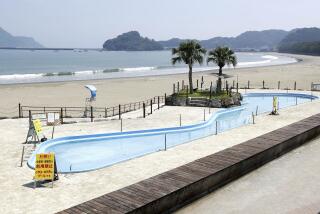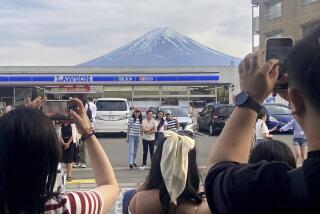Tokyo sees steady exodus amid nuclear crisis
- Share via
Reporting from Tokyo — Marco Gutierrez was taking no chances. With radiation still leaking this weekend from the damaged Fukushima nuclear plant 150 miles away, the Tokyo resident joined the legions of foreigners — and a growing number of Japanese — fleeing the world’s most populated city.
“I have friends of friends who work for TEPCO, the power company [that operates Fukushima], and they all said that the worst of the radiation exposure was going to take place over the next two days,” said Gutierrez, a 26-year-old consultant from Seattle, as he jostled among the crowds at Tokyo’s Haneda Airport on Saturday for a flight to the southern island of Okinawa, one of the farthest points in Japan from the crippled reactors.
“I’m getting out of here,” he said.
Photos: Unrelenting crisis grips Japan
The majority of foreigners who live in Japan are in Tokyo, the country’s business, political and academic hub. There is no count yet of how many of the city’s more than 422,000 foreign residents have bolted. But the fewer numbers of foreigners apparent in corporate offices and popular shopping districts suggest the exodus is substantial.
The greater Tokyo area is home to almost 35 million people, and the capital has been hit by rolling power blackouts and food shortages. Normally bustling streets have become strangely quiet, cast in darkness as the city’s signature neon is dimmed to ease the load on power grids.
Though the Mar. 11 earthquake badly rattled the city, it did not initially trigger a rush to leave.
The threat of radiation wafting down from the damaged Fukushima plant did.
Tokyo has seen slightly elevated radiation levels in recent days, but it was concern that the Japanese government was not fully forthcoming about the crisis that led foreign governments and companies to advise their nationals to leave.
China was the first country to organize mass evacuations, providing transport for at least 3,000 of its citizens from Tokyo and northern Japan this week, according to the New China News Agency. France, followed by Britain, Germany and others, began urging its citizens to avoid non-essential travel to Tokyo and northeastern Japan.
Spain arranged for a 400-seat charter flight back to Madrid on Sunday for its nationals. The Australian government was said to be offering loans to citizens for commercial flights out of Tokyo. Taiwan boosted the number of flights from Tokyo to Taipei.
Meanwhile, several European and American companies have temporarily relocated their operations to Osaka or other Japanese cities well south of the capital.
The Japanese government contends that its response to the nuclear crisis complies with international standards and says foreign governments are being overly cautious. It is worried about the long-term effect on the attraction of Tokyo as a corporate capital, and of the potential blow to tourism.
Noriyuki Shikata, deputy Cabinet secretary for public relations at the prime minister’s office, said Japan wasn’t opposed to the measures taken by foreign governments. He noted that foreign governments “may take a more conservative approach. But at the same time the measures that we are implementing are in accordance with international health standards.”
The U.S. government has been among those countries urging its citizens to move at least four times farther from the Fukushima plant than the 12-mile evacuation zone imposed by the Japanese. Some families of U.S. Embassy workers have left the country on two U.S. government-chartered planes.
But Washington is also wary of offending an ally.
“This was not an evacuation. It’s a voluntary departure,” said a U.S. official, reflecting the sensitivity surrounding the issue.
And some nations have remained circumspect. The Mozambique government, for example, said that there still was no reason for its citizens in Japan to panic.
“They’re mostly students in the southern part of the country,” said Ambassador Belmiro Jose Malate as he waited in line at Haneda Airport to board a plane for southern Japan on a business trip. “I know that some people have fled south to Osaka because of the nuclear scare, but there are still a lot of foreigners in Tokyo.”
It isn’t just foreigners who are leaving.
Many Japanese are joining the move south, driven either by worry or a desire to get away from the discomforts in the capital. One woman standing at a railway station in Tokyo, waiting for a train to her parents’ home in Kobe, 265 miles to the west, said the last straw was a 3 1/2- hour-long blackout Friday night that left her 4-year-old son screaming, “Turn on the light, turn on the light!”
Giving only her first name, Hiromi, the 36-year-old said electric power was restored within a week of the 1995 earthquake in Kobe, where she lived at the time. “This is worse,” she said, because there’s so much uncertainty.
Namiko Bando, 33, was bound for Kobe too — and also leaving behind her husband. Holding her 5-year-old girl’s hand, Bando gently stroked the head of her infant son, wrapped around her body. “If it wasn’t for the children, we’d stay,” Bando said as her husband, who would remain in Tokyo for his job, saw them off.
Foreigners also worried about their families’ health. At Haneda’s domestic terminal, Urs Roesch said he’d seen enough for his instincts to urge him to get his family out of Tokyo. A few days ago, his wife and small child left for Kobe, and on Saturday, the 39-year-old was headed to stay with them for a few days.
“I have a 2-year-old child, so I can’t take any chances,” said the Swiss native. “If things go pear-shaped in Tokyo, I don’t want my family to be part of any stampede out of this city. This way, I have only myself to worry about.”
Roesch, who heads the risk management department at an IT company, says the Swiss Embassy in Tokyo had contacted 1,600 of its 1,800 citizens in Japan with advice to leave the country. He said he may heed it and move his family to Australia.
“I’m not normally a guy to panic,” Roesch said as fellow travelers watched TV images of ominous smoke leaking from the reactor. “I’m part of the crisis management team in my company, so I have to keep my cool.
“But I’ll admit this whole thing has gotten even me a little shaken.”
Photos: Unrelenting crisis grips Japan
Special correspondents Kenji Hall and Yuriko Nagano in Tokyo contributed to this report.
More to Read
Sign up for Essential California
The most important California stories and recommendations in your inbox every morning.
You may occasionally receive promotional content from the Los Angeles Times.












